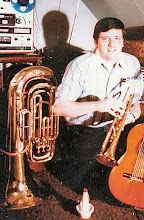

1. Mahogany Hall Stomp
2. Chinatown My Chinatown
3. Do You Know What It Means To Miss New Orleans
4. Da-Da Strain
5. St. Louis Blues
6. Sweethearts On Parade
Side Two
1. Original Dixieland One-Step
2. Dark Eyes
3. Wang Wang Blues
4. Mama Don't Allow It
5. Please Don't Talk About Me When I'm Gone
6. Beale Street Blues
Liner Notes:
Conducted by George Girard.
Recorded at the Parisian Room, New Orleans, June 12, 1956.
Recording Engineer: Jepson Miller.
Produced and directed by Herman Diaz, Jr.
Cover photo by Lucky Kaderian
© by Radio Corporation of America, 1956
George Girard And His New Orleans Five
Personnel:
George Girard trumpet
Harry Shields clarinet
Bob Discom piano
Bob Havens trombone
Emile Christian bass
Paul Edward drums
After Louis Armstrong, Sidney Bechet, King Oliver and the other great jazz stars of that early generation left New Orleans more than thirty-five years ago for greener pastures, the Crescent City seemed to dwindle as a jazz center. Occasionally a musician from New Orleans made his way north to achieve some measure of fame but since New Orleans was no longer a great jazz seedbed he might have picked up almost as much jazz background if he had been born in Cheraw, South Carolina, as Dizzy Gillespie was, or Great Barrington, Massachusetts, as Shorty Rogers was.
But suddenly, after World War II, the town that gave birth to jazz rediscovered its native music and the young musicians of New Orleans came face to face with the startling fact that they had a heritage, the noblest heritage in all jazz. Instead of hustling off to Los Angeles or Chicago or New York to seek their musical fortunes, they stayed at home and began pumping strong new blood into the old New Orleans jazz tradition.
George Girard is one of the brightest stars of this new generation of New Orleans jazzmen. Born in 1930, he started playing his trumpet professionally when he was sixteen. As usual, he began by leaving town to work with traveling bands for a couple of years. But when he came back to rest up and settle his traveler's stomach with some home cooking, he found the town in the throes of a Dixieland revival. Irving Fazola, the great clarinet star of the Bob Crosby band who came home to play out his string before he died at thirty-six in 1949, was giving New Orleans a new reason to remember its great jazz days and the New Orleans Jazz Club was beating the drums and blowing the trumpets for a revival of the great jazz days of the past.
Girard, who had never bothered with Dixie before, was swept up in this local enthusiasm. He sat in with Tony Almerico's band (which can be heard in Vol. 1 of this Dixieland Festival series, VIK LX-1057) and picked up the knack and the repertoire of the Dixielanders. The next year, when he was nineteen, he became the trumpeter in the Basin Street Six, one of the two outstanding young bands formed in New Orleans since the war (the other is the Dukes of Dixieland, featured on VIK LXA-1025). The Basin Street Six had three years of high success but this success brought on more out of town bookings than some of the stay-at-home members wanted to take. So the band broke up. That was when Girard formed his own group. He took it into the Famous Door on Bourbon Street in 1952 and it has been there ever since.
Three of Girard's men have been with him from the start - pianist Bob Discom, drummer Paul Edwards and bassist Emile Christian. Discom has spent all his life in New Orleans but most of his musical career has been concerned with serious music. Girard gave him his first professional job as a jazz pianist. Edwards is an example of the revitalized jazz lodestone that New Orleans had become. A native of Columbus, Ohio, he took such a liking to Dixieland music that he packed up and went to New Orleans to make it his home. His first job there was with this band.
Christian is a direct connecting link with the halcyon days of New Orleans jazz. He played trombone with that pioneering group, the Original Dixieland Jazz Band. Early in the Twenties, he went to England with the ODJB and stayed on for twenty years. Since his return to New Orleans, Christian, who is now fifty-nine, has given up the trombone in favor of the bass.
Clarinetist Harry Shields also provides a connection with the ODJB, although a less direct one. His brother was Larry Shields, the magnificent clarinetist in that early group. Harry, a contemporary of Emile Christian, has spent most of his musical career in New Orleans.
Trombonist Bob Havens, like Paul Edwards, is a young outlander who has been lured to New Orleans by its music. Havens was playing with Ralph Flanagan's band when he first heard Girard's group at the Famous Door. Girard just happened to need a trombone man and Havens was so inspired by the band that he quit Flanagan, sweated out his New Orleans union card and took over the trombone chair at the Famous Door.
These recordings were made during a special performance by Girard's band at the Parisian Room on Royal Street. The tunes are primarily well established Dixieland favorites but a special New Orleans flavor is injected by the inclusion of three numbers closely associated with the town's greatest jazz-playing son, Louis Armstrong - Mahogany Hall Stomp, Do You Know What It Means to Miss New Orleans and Sweethearts on Parade.
- JOHN S. WILSON



No comments:
Post a Comment